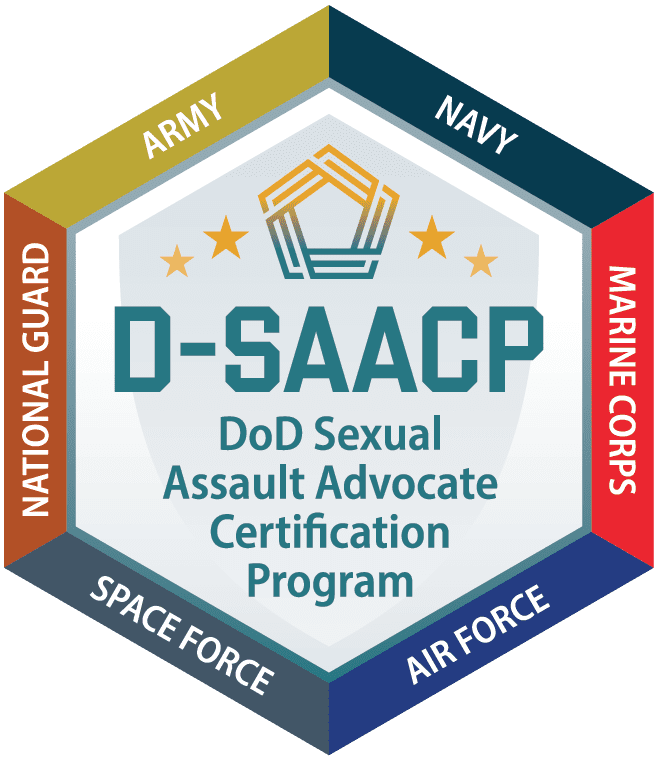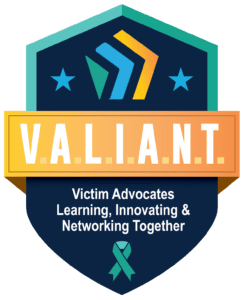Professionalizing the Field of Military Victim Advocacy
The DoD Sexual Assault Advocate Certification Program
NOVA administers the Department of Defense Sexual Assault Advocate Certification Program in partnership with the Department of Defense Sexual Assault Prevention and Response Office (DoD SAPRO).
The Sexual Assault Prevention and Response Office (SAPRO) is the central authority charged with preventing sexual assault in the military and facilitating recovery for warfighters. SAPRO’s mission is to provide unparalleled warfighter support, advocacy, and recovery assistance – anytime, anywhere.
D-SAACP recognizes the critical support Sexual Assault Response Coordinators (SARCs) and Sexual Assault Prevention and Response Victim Advocates (SAPR VAs) provide to victims of sexual assault. SARCs, PMs, and VAs certified through D-SAACP join a growing field of certified civilian victim advocates who are trained and committed to upholding the highest standards of victim care and privacy.

Application and Deadlines
Deadlines and Board Review Dates:
Application Window
Deadline
2026 Boards
11/15/25 – 1/9/26
Jan 9, 2026
Jan 27-28, 2026
1/10/26 – 2/20/26
Feb 20, 2026
Mar 10-11, 2026
2/21/26 – 4/4/26
April 3, 2026
April 21-22, 2026
4/4/26 – 5/15/26
May 15, 2026
June 4-3, 2026
5/16/26 – 6/26/26
June 26, 2026
July 15-16, 2026
6/27/26 – 8/7/26
Aug. 7, 2026
Sept 3-4, 2026
8/8/26 – 9/18/26
Sept. 18, 2026
Oct 7-8, 2026
9/19/26 – 11/6/26
Nov. 6, 2026
Dec 2-3, 2026
Download the DD Form 2950 (new) or 2950-1 (renewal):
New applicants: Download the DD Form 2950
Renewal applicants: Download the DD Form 2950-1
Please note that forms are secure documents and the content will not be displayed in the preview until it has been downloaded onto your computer and opened.
Please submit all new and renewal applications to the following e-mail: [email protected].
(Please note that this email box is not monitored for questions or corrections)
fax: 703-535-5500
via mail: 510 King Street, Ste 220, Alexandria, VA 22314
Phone assistance: 703-535-6621
Monday-Friday, 0900-1700 Eastern Time (GMT -5)
You will receive an email notification from [email protected] confirming receipt of your application within one week of your submission. If you do not receive a confirmation email in that timeframe, please contact us at [email protected]
Any questions or application corrections, should be sent to: [email protected]
Visit the DoD Sexual Assault Prevention and Response Office website: www.sapr.mil
Frequently Asked Questions
APPLICATION DEADLINE
- January 9, 2026
- February 20, 2026
- April 3, 2026
- May 15, 2026
- June 26, 2026
- August 7, 2026
- September 18, 2026
- November 6, 2026
Applications must be submitted during the designated renewal application window.
Please send updated/corrected documents to: [email protected]
If you have been certified by D-SAACP at any time in the past, you are still considered a renewal applicant. You must stop working directly with victims until your certification is renewed.
- If you missed one or fewer than seven application deadlines, submit DD Form 2950-1 and 32 hours of continuing education completed within the last two years.
- If you missed eight or more deadlines, submit DD Form 2950-1 and the initial training certificate completed within the last year.
Please review the D-SAACP Additional CEUs Resources.
To provide feedback to DoD SAPRO, please use the DoD Safe Helpline Military Feedback Form.
To submit an ethical concern, please use NOVA’s Ethics Inquiry Form. Please note: all ethical inquires received will be provided to DoD SAPRO.
Have questions about the D-SAACP Program? Common questions and answers are available in the D-SAACP FAQ Sheet.
Have questions about DoD SAPRO? Visit their Frequently Asked Questions for answers.
For questions about D-SAACP, Visit DoD SAPRO D-SAACP webpage.

VALIANT
SAPRO is transitioning VALIANT to a new platform. We will contact all current members when the new platform launches. In the interim, please visit www.sapr.mil/victim-assistance for additional resources and updates.
DoD SAPRO is excited to announce the launch of VALIANT: Victim Advocates Learning, Innovating, and Networking Together, a new Department of Defense-wide online community of practice for Sexual Assault Response Workforce personnel.
What is VALIANT?
Hosted on APAN (All Partners Access Network), VALIANT is home for the DoD and Services to share resources, encourage networking, and foster the collaborative effort to respond to sexual assault in the military. VALIANT features include a Discussion Board, Resource Library, a Learn Collection with webinar recordings and self-paced courses, and more!
Who can join?
VALIANT is open to military Victim Advocates, SARCs, Program Managers, and other SAPR/SHARP response personnel. Members must have a .mil email address.
How do I join?
Follow the directions in the Account Creation Instructions document HERE!
Who do I contact with questions?
Email the VALIANT inbox at [email protected].
Continuing Education: Promoting continuous improvement of advocacy skills and knowledge.
The Continuing Education requirement provides the opportunity for you to advance your advocacy skills and keep your knowledge current. Continuing education should be spread out over your two years of certification and go beyond the basics. For continuing education resources, please review the D-SAACP Additional CEUs Resources.
Formal guidance for Continuing Education can be found on the SAPRO website.
32 hours of continuing education (CEUs) are required for renewal.
- The preferred method of CEU documentation is a signed page 14 of the DD Form 2950-1 or a signed DSAID printout. This is the only way to document in cases where certificates are not available.
- If training certificates are provided, they must clearly state your name, training date, number of hours, and include a physical or verified digital signature. If the certificate is missing any of these requirements, please use page 14 or DSAID.
- A minimum of 2 hours of victim advocacy ethics must be documented (general professional ethics nor HIPAA training do not meet the victim advocacy ethics requirement).
- Safe Helpline 101 or 102 is required for all renewals(can be online or in-person).
- 8 hours of “in-person” training. DoD SAPRO requires that 8 hours are “in-person” (the “in-person” training requirements may be met by attending live webinars but not by watching recordings).
- If you are a renewing applicant, you cannot repeat the same CEUs you completed for your prior renewal(s). If you take a training that has been updated, please be sure this is indicated in the documentation.
- You are not limited to sexual assault advocacy training – advocates should seek training in emerging issues in victim-focused, trauma-informed care relevant to your particular environment. However, no more than 12 hours can be from peripheral topics (such as suicide prevention). Although these topics are important, most of your CEUs should be more closely related to victim advocacy.
- Any training that is over 8 hours requires a training outline/agenda to be submitted with the application (ensure your name is written on the agenda so the documentation can be correctly assigned to your packet).
Bridge Application
The Bridge Application is for DoD personnel with current or recently expired (within six months) D-SAACP credentials who intend to transition to civilian advocacy. For more information, please visit NACP.org.
Suspension and Revocation process
For questions about suspension, revocation and reinstatement, please visit the D-SAACP Credential Suspension and Revocation Process
